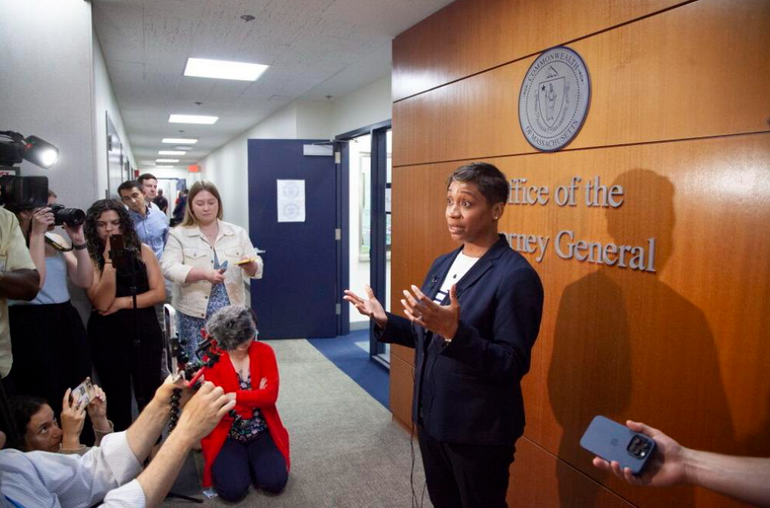Massachusetts could receive more than $100 million as part of a tentative new settlement between attorneys general, Purdue Pharma and the company’s controlling Sackler family that reshapes some of the previous liability terms rejected by the nation’s highest court.
More than six months after the U.S. Supreme Court blocked an earlier $6 billion settlement, parties agreed on a larger $7.4 billion deal in which Purdue would cease to sell opioids in the United States, the Sacklers would give up control of the bankrupt company, and states would receive significant funding to fight the opioid epidemic.
The settlement in principle still needs to be approved by the U.S. Bankruptcy Court for the Southern District of New York. Parties have not yet filed any official settlement agreement.
Attorney General Andrea Campbell’s office estimated that Massachusetts could receive up to $108 million from the settlement.
The deal could bring to a close a years-long legal battle involving a host of lawsuits against the Sacklers and Purdue, accusing the OxyContin makers of fueling the opioid epidemic that has killed hundreds of thousands of Americans.
“The Sackler family will forever be remembered as a symbol of greed, profiting off pain to destroy countless lives across the Commonwealth and country,” Campbell said in a statement. “While this settlement cannot bring back the lives lost, it will bring in much-needed funds to begin to remediate the damage and ensure that the Sacklers can be held accountable for the lasting devastation they have caused. I am incredibly grateful to the families who turned their pain into purpose to inform our work in this space.”
Purdue filed for bankruptcy in 2019, prompting courts to pause litigation against the company — including a lawsuit then-Attorney General Maura Healey filed a year earlier, the first targeting individual members of the Sackler family.
The company and family announced a settlement in 2021 with states, local governments and other affected people, and it grew in size in 2022 with the addition of other states. But the U.S. Supreme Court last year invalidated the deal, ruling 5-4 that it ran afoul of bankruptcy law by giving the Sacklers themselves — who did not file for bankruptcy as individuals — immunity from legal liability.
Campbell’s office said the updated settlement announced Thursday “does not offer the Sacklers any such automatic immunity but instead requires the Sacklers to secure the releases of parties with claims against them.”
Citing sources familiar with settlement negotiations, The New York Times reported that the framework of a new deal would also require claimants such as states and municipalities to set aside hundreds of millions of dollars, effectively as a legal defense fund to help the Sacklers defend themselves in future cases.
Campbell’s office said the New York Times description was not accurate. St
Other attorneys general who joined Campbell on the settlement in principle represent the states of New York, California, Colorado, Connecticut, Delaware, Florida, Illinois, Oregon, Pennsylvania, Tennessee, Texas, Vermont, Virginia and West Virginia.
The proposed settlement calls on the Sacklers to pay $1.5 billion in the first three years, followed by $500 million after one additional year, $500 million after two years and $400 million after three years. Purdue will separately owe nearly $900 million in the first payment, according to Campbell’s office.
Money would fund opioid addiction treatment, prevention and recovery programs, the AG said, calling it the largest settlement to date involving individuals who allegedly played a role in the opioid crisis.
The Sacklers would cease their control of Purdue, and the company would be barred from selling opioids in the United States, according to Campbell. Participating states and other creditors would select a board of trustees to determine the company’s future, and an independent monitor will continue to oversee it in the interim.
In a statement, Purdue praised the potential settlement as a positive step.
“We are extremely pleased that a new agreement has been reached that will deliver billions of dollars to compensate victims, abate the opioid crisis, and deliver treatment and overdose rescue medicines that will save lives,” the company said. “We have worked intensely with our creditors for months in mediation, and we are now focused on finalizing the details of a new Plan of Reorganization, which we look forward to presenting to the bankruptcy court.”
Campbell’s office said the settlement would also make public more than 30 million additional documents covering Purdue’s opioid business, “including attorney-client privileged communications about the original FDA approval of OxyContin, tactics used to promote opioids, and documents relating to Purdue’s compliance with the 2007 consent judgments between Purdue and numerous states.”
Prior settlements have already produced a sizable public document repository.
Healey, who is now governor, said she hopes “this long overdue resolution provides some comfort to the families.”
“This litigation has always been about delivering justice for those who have lost loved ones at the hands of Purdue Pharma and the Sacklers,” Healey said in a statement provided by Campbell’s office. “This resolution puts an end to Purdue Pharma and the Sacklers’ involvement in this industry once and for all. It also makes sure the Sacklers can be held accountable for their actions, provides an unprecedented level of transparency into their business dealings to better ensure this never happens again, and delivers significant funding to support treatment, prevention and recovery efforts in Massachusetts.”

